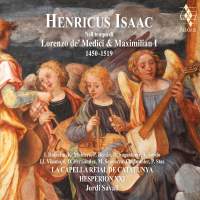Texte paru dans: / Appeared in: |
||||
|
Outil de traduction ~ (Très approximatif) |
||||
|
Reviewer: J.
F. Weber
Though this label’s latest
entry in its lavish series of productions is only a single disc and is
packaged in the usual size rather than the larger book format, it includes a
book of 200 pages lavishly illustrated in color photographs, period art, and
music reproductions. The life of Heinrich Isaac (1450–1519) is traced in 15
of his works marking his service at the courts of Lorenzo de’ Medici in
Florence from 1486 and Maximilian I from 1496, then his return to Italy at
the Este court in Ferrara in 1515. The history continues after Isaac’s death
to the coronation of Charles V in 1530. In anticipating the quincentenary of
Isaac’s death, Savall proposes to restore his stature to the level of his
contemporaries La Rue, Obrecht, and Josquin des Prez, noting that the
revival of his reputation began with Anton Webern’s dissertation (he was
only 19!) on the Choralis Constantinus, Book 2 under Guido Adler as long ago
as 1902. The longest work, Christus filius Dei (over 12 minutes), comes at the end, supposedly to celebrate the coronation of Charles V as Holy Roman Emperor, though it is a contrafactum of Virgo prudentissima. That piece honored the Blessed Virgin and Maximilian I, then was retexted by a publisher in 1538 to honor Christ and Charles V (ignoring the significance of the cantus firmus, a Marian chant). Three other major works are grouped together in the center of the program. Quis dabit capiti meo aquam (not be confused with similar texts set by others) was a lament on the death of Lorenzo de’ Medici in 1492. Sancti Spiritus assit nobis gratia, though only composed for the Diet of Constance in 1507, is used here to mark Maximilian I’s succession as emperor in 1493. Angeli, archangeli, not even mentioned in the notes, is a marvelous six-voice motet for All Saints, oddly enough built on a cantus firmus from a chanson of Binchois. Another six-voice motet that should be mentioned is Optime Divino, inserted here to mark the coronation of the Medici pope Leo X. The original Latin text celebrates the sacred (papal) and secular (imperial) powers by combining two chant cantus firmi intertwined, a plea both for peace and against the Turks. The remaining 10 selections are brief, though two are worthy of mention, the famous Innsbruck, ich muss dich lassen and an introit from Choralis Constantinus, the composer’s huge collection of Mass Propers, rivaled only by the smaller Gradualia of William Byrd. The Lenten introit, “the pangs of death have surrounded me,” seemed appropriate to mark the composer’s death.
Quis dabit
capiti meo aquam is the most familiar piece, heard most recently from Dirk
Snellings (35:5) and Edward Wickham (31:2). The original Virgo prudentissima
was recorded by Stile antico (38:3), Henry’s Eight (23:3), and Peter
Phillips (15:3), and Angeli, archangeli by Edward Wickham (18:3). Sancti
Spiritus assit nobis gratia, a sequence for Pentecost, was heard from
Chanticleer (8:5). Savall’s interpretations easily rival all of them, and
the collection forms a cross-section of Isaac’s music. There are too few CDs
devoted entirely to the music of Isaac. Savall aims to reverse that course.
Well worth hearing, and a suitable gift as well. | ||||
|
|
||||
|
|
|
|||
|
Cliquez l'un ou l'autre
bouton pour découvrir bien d'autres critiques de CD |
||||




